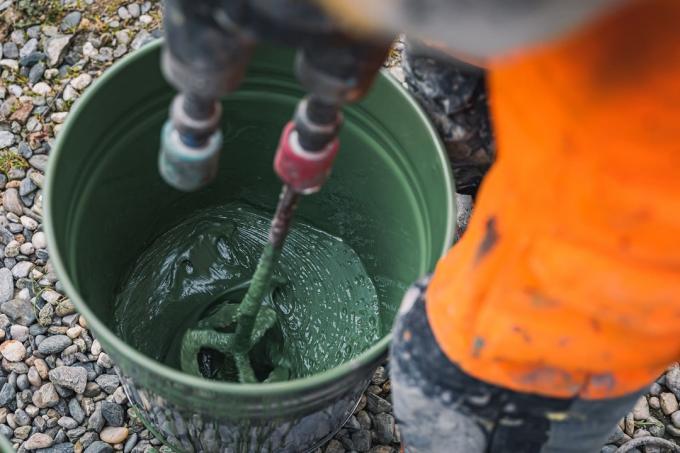
Synthetic resin has some advantages for sealing pavement joints, but also disadvantages. The suitability should therefore be checked in advance in order to prevent potential problems and avoid the associated effort.
In a nutshell
- Synthetic resin is easy to process
- Versatile color customization possible
- durable sealing
- higher risk of cavities and frost damage
- awkward removal required
Table of contents
- What is resin?
- Advantages
- Disadvantages
- Seal paving joints with synthetic resin
- frequently asked Questions
What is resin?
If synthetic resin is used to seal paving joints, it is usually so-called epoxy resin. This consists of hardeners, polymers, reaction resins and pigments.
Advantages

For a long time, cement mortar was the material of choice when sealing pavement joints. Nonetheless, resin has grown in popularity due to its benefits. The clear advantages are:
- less susceptible to regular and heavy loads
- high chemical resistance
- longevity
- simple mixing and processing
- Diversity in visual design
Synthetic resin can expand and therefore adapts better and faster to loads. Unlike cement mortar, it will not crack or become porous. As a result, it lasts longer as a jointing material and, among other things, performs better in areas with frequent movement such as sidewalks or driveways.
In addition, it can, for example, in kitchens or bathrooms as well as next to pools be used because chlorine, fats and alcohol do not have a negative effect on the material.
Disadvantages
The disadvantages of synthetic resin when sealing pavement joints should not be neglected when deciding on the right material. Among other things, they are decisive for the durability and resistance of the seal.
- higher cost
- Sensitivity to solvents
- heat sensitive
- shorter processing time
Synthetic resin dries out very quickly, which makes processing more complex. This must be done quickly, as hardened resin is difficult to remove.

Another potential disadvantage and danger is unnoticed cavities. If the resin has not been inserted correctly and sticks to the upper edges, this can give the impression of a closed joint to the outside. When there is a bubble between the layers, there are several problems associated with it. This includes:
- Accumulation of water or moisture
- lower carrying capacity
- higher susceptibility to frost damage
- increased risk of fracture
- underwash possible
A notice: When grouting or sealing with synthetic resin, a veil can form, which can usually only be removed with a special cleaning agent. Outside, it can disappear after a few months due to the effects of the weather. A chemical treatment is required indoors.
Seal paving joints with synthetic resin
With the synthetic resins there are considerable differences in terms of the mixing ratios. It is therefore essential to follow the manufacturer's instructions.
The joints and paving must be undamaged, clean, dry and free from dust or grease. It may therefore be necessary before sealing the paving joints with synthetic resin thorough cleaning to carry out and make corrections. It is also important to prepare:
- avoid warm dry weather
- Choose a day with mild temperatures and high humidity
- 18 to 22 °C ideal
- easy processing possible
- no need to worry about drying out quickly

Synthetic resin is applied to seal the joints with a thin brush. A ruler can be used to avoid protrusions. To save time, you can also seal the plaster over a large area with a paint roller and not just cover the joints. In any case, you should work quickly and with pressure, because this way you will achieve better and even coverage. This also prevents the formation of bubbles under the resin.
Tip: It is essential that you avoid using solvent-based products for the preparatory cleaning and subsequent care, as they reduce the durability of the synthetic resin.
frequently asked Questions
Depending on the type, synthetic resin has a shelf life of one to three years as long as it is in the original unopened packaging. Products approved for aviation have the lowest shelf life at around one to two years. If the packaging has already been opened but is left tightly closed in a dark and cool place, the shelf life drops to a maximum of one year. A quick processing after opening is therefore recommended.
Synthetic resin or epoxy resin is significantly more expensive than cement mortar. The price per kilogram is between 15 and 25 euros per kilogram, depending on the type and colour. In comparison, cement mortar only costs 2 to 5 euros per kilogram.
Grouting can be done with cement mortar. If joints and stones are to be sealed, special stone impregnating agents can be found in addition to synthetic resin. These can be sprayed on over a large area or applied with a paint roller and brush. This provides lasting protection against moisture and dirt.
